

|
Back to |
| The Front Page |
| News & Features |

|
Jiminy Wicket scores for charity and croquet |
|
By Bob Alman photos courtesy of James Creasey Posted July 29, 2013
|
The elemental nature of Golf Croquet as a sport makes it an ideally interactive bridge between partners and in competition for many types of groups, ranging from corporate events to novice programs at croquet clubs: All you do is get the ball through the next hoop, and you win the point! James Creasey of Jiminy Wicket has successfully adapted the game to his purposes, and is expanding to a broader international audience.
The true object of the game, according to James Creasey, founder and managing visionary of Jiminy Wicket, is to make smiles. Creasey connected Alzheimer's and croquet early in this century in the person of his father, affected by Alzheimer's, who responded to the game like nothing else, even after he had lost the faculty of speech. We reported that touching story in "Playing through Dementia." Now, Creasey is putting his idea into action on a much larger stage, based on the model created in his native Denver on The Longest Day--June 21.
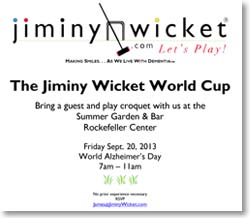
|
Croquet for everyone--from dawn to dusk
It really was the longest day of the calendar year, and Creasey was there before dawn to set up four "half-courts" on the lawn and make sure the equipment was in order. After that, he would greet and train the volunteers who would come in various shifts throughout the day to partner Alzheimer's patients and instruct them in Golf Croquet.
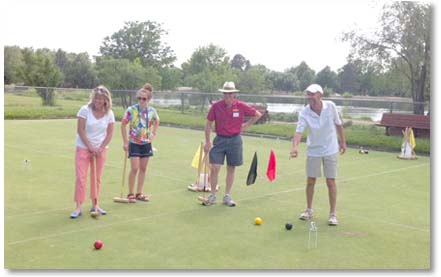
|
| The first order of business is for James (pointing) to train the senior helpers. |
Creasey's rules are the standard ones, with just a few variations. And although the standard rules are followed, the tactics and strategy are a different matter entirely: the focus in these games is to get one of the partner balls through the wicket in the most straightforward manner. But that's the thrill of the game at any level--scoring
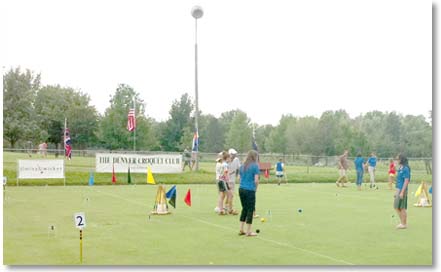
|
| The sun's up higher now and the games are in full swing. |
People affected with age-related dementia often find themselves terribly isolated, unable to make meaningful connections with other people--especially if they've lost the faculty of speech. Jiminy Wicket knows how to address that issue for caregivers and their Alzheimer's patients who have limited occasions for interactive relationships with most people, including their own families. The perfect medium for those relationships turns out to be Golf Croquet--which also can bridge the generations as few other sports can.
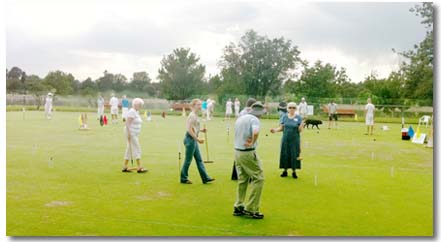
|
| Afternoon clouds threaten, but the rain never comes and the games continue. |
The game's the same, but the focus is different
On June 21, two of the Denver club's four miniature Golf Croquet courts were organized especially for the Alzheimer's partnerships, with big numbers on top to indicate the order of the hoops (one of the most difficult issues in teaching the game, for everyone, as it turns out). The other two half-courts were normally set.
The volume of visitors throughout the day fluctuated, and Creasey did take some breaks, but he was at the lawn from dawn to dusk. He did not leave until the equipment had been put away after the last players had left in the fading light of the setting sun. (The court has lights--but the publicity promised play only during the daylight hours.)
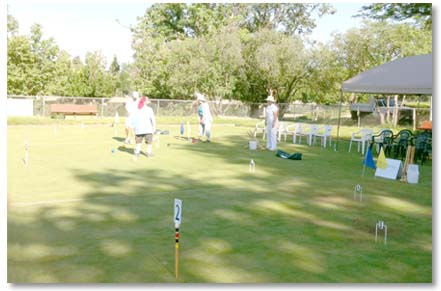
|
| Lengthening shadows bring an end to 14 hours of continuous croquet. |
"The Longest Day" was conceived as an annual fund-raising day by the Alzheimer's Association, and it can be applied to any activity. As it turned out, it adapted perfectly for Golf Croquet in Washington Park.
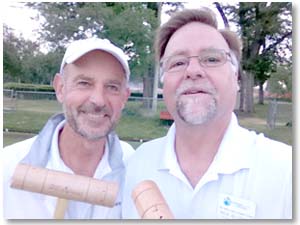
|
| James Creasey (left) with Rick Bloeman, president and CEO of Colorado Senior Care Advisors, the event's main sponsor, beginning The Longest Day at 5:30 AM. |
According to Creasey at least 150 people were involved in the event, and the Denver Croquet Club alone netted about 10 new members--which would constitute about a quarter of the small club. Everyone who visited got a special "deal" on membership. According to the president of the Denver Croquet Club, Ron Eccles, "The special discount on membership was available only on that day--June 21."
Publicizing croquet along with Jiminy Wicket
Eccles says the relationship with Jiminy Wicket has helped his club in many ways--including the obvious one of news coverage for the special event: "The Jiminy Wicket events have always brought in new club members, and the association is good for the morale of the club. Our members who volunteer on a weekly basis know they're helping with a major health concern. They're helping both the Alzheimer's patients and their family members and caregivers."
According to Eccles, "If a croquet club is looking for a way to gain positive press, increase membership, give to others in their community and make croquet a contribution to people who are suffering, this is a great way to do it."
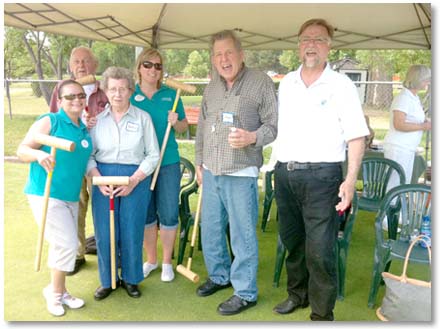
|
| A group from Juniper Village shows the typical mix of seniors, family members, and helpers. |
Denver is Creasey's home-town, so it makes sense that the Jiminy Wicket program is a big thing there and operates year-round. In summer, the Denver Croquet Club courts are used, but in winter a community hall in a local church is donated for a weekly event on Monday morning from 10 AM to 12 Noon that handles typically as many as 12 partnerships, including eight to ten or more Alzheimer's patients.
Several local TV stations came on June 21, good publicity for the club, Jiminy Wicket and the Alzheimer's community. Jiminy Wicket is in the process of getting non-profit status, and based on the success of the local "Through Hoops to Hope" program--pairing Alzheimer's patients with high school students--is planning to go national with the program in as many as a hundred high schools and colleges next fall.
The launch for this expansion will be the first annual Jiminy Wicket World Cup at Rockefeller Center's iconic ice rink in Manhattan from 7am-11am on World Alzheimer's Day – Friday, September 20, 2013. "If you're in the neighborhood," Creasey says, "you're invited to drop by and have a game."
ABOUT JAMES CREASEY: Five years ago on a summer vacation, James Creasey discovered new connections with his father in the silence and confusion of dementia. Playing croquet together, Maxwell smiled. Maxwell's offspring and grandchildren now had an activity to enjoy with their 'Poppa'. Since then, James has run a weekly year-round croquet program for the Alzheimer's Association in Denver, Colorado. He founded Jiminy Wicket to make smiles for people living with dementia. Jiminy Wicket runs their Though Hoops to Hope program in high schools and colleges in the US and UK to raise awareness of this disease, reduce the stigma, and make smiles. Jiminy Wicket has played croquet with thousands of people from 3 to 93 years old and from 84 different countries. They all go away with a pocketful of smiles. For further information on these programs, email James Creasey directly.